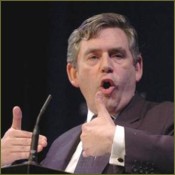Review: “The End of the Party” by Andrew Rawnsley
[AMAZONPRODUCT=0670918512]
I bought this tome shortly after its publication; however, I didn’t get around to reading it until I had to contend with less than optimal circumstances. On March 17, my paternal grandmother died; a day later, I was on my way to America for the funeral. There was little time to think: I just threw my clothes and supplies into my bag. As I am taller than a circus midget, I knew there was almost no prospect of my getting any sleep on the flight. Furthermore, the headphones the airline uses are precisely the type which are the right size to pop out of my ears without warning. Without rest or entertainment, I needed a fairly meaty volume in order to pass the time. As I was taking an evening flight, it also had to be interesting enough to keep me from succumbing to boredom in the darkness. I cast a glance at my nighttable, which at the best of times is overloaded with books: “The End of the Party” immediately fit the bill.
This is not my first encounter with Mr. Rawnsley’s coverage of New Labour; I read with relish his first book about the subject, “The Servants of the People”. At the time, his precision in describing the personalities driving New Labour seemed uncanny; in “The End of the Party” it is positively eerie. As a result, in some ways, it reads like a novel: Rawnsley is able to describe the inner thoughts of his dramatis personae and yet, this doesn’t jar.
If Rawnsley is right, the people of Britain should be very worried; behind the carefully crafted facade of hyperbole and spin, New Labour is a menagerie of disturbed personalities. We are first presented with Tony Blair, who excels at public presentation, but is shown to have a problem standing up to anyone with a stronger will than his own. For example, President Bush is portrayed as being more stubborn than his British counterpart; Blair’s personal attributes and his desire to cling to America meant that he was willing to go along with whatever the Americans wanted, even if he knew that the consequences could be disastrous. Indeed he was so focused on maintaining the alliance that he somehow was able to compartmentalise the data he received: for example, information regarding Iraq’s military capabilities was finessed and massaged until possibilities became certainties. There is no doubt this agenda of purposeful embellishment was driven by the Prime Minister and his acolytes; it is beyond refutation that Britain went to war in Iraq merely because it was what President Bush wanted to do.
Blair’s quirks were just as problematic in the domestic sphere: if Rawnsley is correct, Britain has essentially had two Prime Ministers for the bulk of New Labour’s time in office. Gordon Brown has maintained tight control over domestic policy, which has had the consequence of stifling public service reform. Brown’s personality is described in excruciating detail: he is portrayed as jealous and obsessed, easily offended, and extremely territorial. Indeed, his temperament was so problematic that the MP for Birkenhead, Frank Field, described Brown as “Mrs. Rochester” and begged Blair not to let him “out of the attic”. Rawnsley, however, is resolutely fair: he leaves the reader with the unmistakable impression that Brown has the will to be Prime Minister and appears to work well when he is facing one big issue at a time (such as the credit crunch). Yet, his managerial skills are poor: his most glaring problem is his total inability to delegate. He ends up micromanaging issues, and in the process tends to miss the bigger picture. Furthermore, Brown’s dearth of communication skills only serve to highlight rather than mask his flaws. In many ways, it’s a pity that the best qualities of Blair and Brown could not combine into one person, as that individual would be a formidable leader.
New Labour to this day remains a coalition of competing and hostile factions based upon their admiration for either Blair or Brown. The return of Peter Mandelson to government has soothed some of these tempers, but nevertheless, there is a pathology at the heart of government: the Cabinet appears to be largely comprised of scheming, unhappy and driven people like Brown’s long-time comrade in arms Ed Balls, who are constantly grasping for control, not just of government, not just the public, but also the nation’s narrative. Behaviour that would not be tolerated in a more typical context, e.g., Brown screaming at Blair that the latter had ruined his life, becomes expected at these rarified elevations. Power in this case is a projection of personal sickness, and it has the unfortunate consequence of affecting the lives of millions. In the case of Iraq and Afghanistan, it is getting some of Britain’s best and brightest killed.
“The End of the Party” is useful in exposing this truth; Rawnsley does not state it explicitly himself. It would be entirely unnecessary for him to do so. However, one wonders given the recent tightening in opinion polls if his choice of title is indicative of a wish as well as the likely outcome of the next general election. While there are individual Labour party members who are genuinely motivated by a spirit of public service and whose sincerity is beyond doubt, their efforts support an apparatus which seems to have run its course. Decline and fall is the overall sensation one gets as the book draws to a close, though the end of the Labour administration is yet to be written. It is difficult to conclude anything other than that this Government’s termination is justified.
I found that I was on the ground by the time I got to the last pages; I read quickly, however my rapid progress was mostly due to the fact the book was so absorbing that time’s passage had escaped my perception. Intriguing, entertaining, appalling and yet compulsive – “The End of the Party” fulfilled its function as a travel companion; it should also be on the nighttable of every potential voter who wants to understand what they’re voting for or against.

 Last week, I attended an evening seminar at the Management school of my university. The lecturer was, in a former life, a senior manager in a pharmaceutical firm. What he had to say about the state of the industry was not particularly comforting: apparently, the industry’s present business model is thoroughly broken, and indeed, many companies are one bad drug away from complete collapse. In particular, he highlighted the plight of Merck, whose ill-conceived and over-marketed drug
Last week, I attended an evening seminar at the Management school of my university. The lecturer was, in a former life, a senior manager in a pharmaceutical firm. What he had to say about the state of the industry was not particularly comforting: apparently, the industry’s present business model is thoroughly broken, and indeed, many companies are one bad drug away from complete collapse. In particular, he highlighted the plight of Merck, whose ill-conceived and over-marketed drug  Personally, I don’t believe Gordon Brown is a bully. Genuine bullying is systematic and contains a certain logic: sore points are identified, salt is poured into wounds, and the resulting humiliation provides the assailant with a warm glow. If the recent accounts from Andrew Rawnsley are true, this is not how Gordon Brown has behaved: a lost disk containing the personal data of millions of taxpayers apparently provoked him to the extent that he grabbed an assistant and proclaimed a plot had been hatched against him, which is illogical and absurd. Rawnsley also described how Brown repeatedly stabbed the back of the car seat in front of him with a black marker pen when he was frustrated. These incidents speak of a personality that is in turmoil, not possessed of the cool relish that one associates with a real torturer.
Personally, I don’t believe Gordon Brown is a bully. Genuine bullying is systematic and contains a certain logic: sore points are identified, salt is poured into wounds, and the resulting humiliation provides the assailant with a warm glow. If the recent accounts from Andrew Rawnsley are true, this is not how Gordon Brown has behaved: a lost disk containing the personal data of millions of taxpayers apparently provoked him to the extent that he grabbed an assistant and proclaimed a plot had been hatched against him, which is illogical and absurd. Rawnsley also described how Brown repeatedly stabbed the back of the car seat in front of him with a black marker pen when he was frustrated. These incidents speak of a personality that is in turmoil, not possessed of the cool relish that one associates with a real torturer. Shortly before Christmas, I had dinner at a Thai restaurant located near Canary Wharf. The cocktails at this establishment are more well regarded than the food, and the service is more infamous than famous, facts which the proprietor may have been trying to ameliorate by leaving a brightly packaged Christmas cracker on each placemat. I opened mine and found a hat made of paper which was thinner than a 1000 Franc note, a joke which was dreadful even by Christmas cracker standards and a small green blob of plastic which was no larger than the tip of my thumb. It took me a moment to discern that the blob was a goat. I sat the pathetic animal facsimile beyond the edge of my plate and looked at it.
Shortly before Christmas, I had dinner at a Thai restaurant located near Canary Wharf. The cocktails at this establishment are more well regarded than the food, and the service is more infamous than famous, facts which the proprietor may have been trying to ameliorate by leaving a brightly packaged Christmas cracker on each placemat. I opened mine and found a hat made of paper which was thinner than a 1000 Franc note, a joke which was dreadful even by Christmas cracker standards and a small green blob of plastic which was no larger than the tip of my thumb. It took me a moment to discern that the blob was a goat. I sat the pathetic animal facsimile beyond the edge of my plate and looked at it. Travellers to Britain are advised that they may run into a type of person colloquially known as an “eccentric”. These individuals can be identified by their penchant for wearing purple and green striped blazers during Wimbledon fortnight, a bowler hat in the middle of July, or more commonly, by their insistence on sitting in train stations during all kinds of weather and marking down carriage numbers in a large, red leather bound notebook.
Travellers to Britain are advised that they may run into a type of person colloquially known as an “eccentric”. These individuals can be identified by their penchant for wearing purple and green striped blazers during Wimbledon fortnight, a bowler hat in the middle of July, or more commonly, by their insistence on sitting in train stations during all kinds of weather and marking down carriage numbers in a large, red leather bound notebook. For those who haven’t been keeping up with the news or those who live outside the United Kingdom, the biggest news story which is exercising the British public lately has nothing to do with economics or the Winter Olympics; rather, it is a matter of life and death.
For those who haven’t been keeping up with the news or those who live outside the United Kingdom, the biggest news story which is exercising the British public lately has nothing to do with economics or the Winter Olympics; rather, it is a matter of life and death. I don’t recall the last time a Winter Olympics began with the death of one of the competitors. Yesterday, an athlete from the former Soviet republic of Georgia, Nodar Kumaritashvili,
I don’t recall the last time a Winter Olympics began with the death of one of the competitors. Yesterday, an athlete from the former Soviet republic of Georgia, Nodar Kumaritashvili,  Yesterday, I attended an activists’ training course which was held at my union’s headquarters in London. I arrived slightly early, but as I sat down, I noticed that the overhead projector was switched on and that a Powerpoint presentation was ready to go. I raised an eyebrow: the presentation’s template was one that I had utilised at a previous event. I opened my pack of course materials and found a printout of the slides: to my surprise, I found that fully a third of them were ones that I had written. No acknowledgement was present.
Yesterday, I attended an activists’ training course which was held at my union’s headquarters in London. I arrived slightly early, but as I sat down, I noticed that the overhead projector was switched on and that a Powerpoint presentation was ready to go. I raised an eyebrow: the presentation’s template was one that I had utilised at a previous event. I opened my pack of course materials and found a printout of the slides: to my surprise, I found that fully a third of them were ones that I had written. No acknowledgement was present. The British have a talent for self-deprecation. For someone with American origins this is nothing but refreshing: indeed, when I visit my family in the States, I am constantly reminded how patriotism can be elevated from a mere sentiment to a religion. The Stars and Stripes is everywhere: it appears as a gigantic banner fluttering above car dealerships, it’s emblazoned on the front of baseball caps and pinned to the lapels of every national politician. Indeed, the flag is almost a required accessory for every American. It is also conversationally dangerous to suggest in the presence of some Americans that their country may be anything less than extraordinary. At best, one will be reminded in the strongest possible terms that is the “best country”, “land of the free”, “last best hope of mankind”, and so on.
The British have a talent for self-deprecation. For someone with American origins this is nothing but refreshing: indeed, when I visit my family in the States, I am constantly reminded how patriotism can be elevated from a mere sentiment to a religion. The Stars and Stripes is everywhere: it appears as a gigantic banner fluttering above car dealerships, it’s emblazoned on the front of baseball caps and pinned to the lapels of every national politician. Indeed, the flag is almost a required accessory for every American. It is also conversationally dangerous to suggest in the presence of some Americans that their country may be anything less than extraordinary. At best, one will be reminded in the strongest possible terms that is the “best country”, “land of the free”, “last best hope of mankind”, and so on. Last October, my parents paid a visit to London. They spent the first few days of their holiday sampling the delights of the capital: they visited restaurants they enjoy, went to the theatre and did a bit of shopping. Then my father began to feel pain in his lower back; it became serious enough that he decided not to attend a performance of “Carmen” at the Royal Opera House. It was a very bad sign: early the next morning, he found he was in so much pain that he could not move.
Last October, my parents paid a visit to London. They spent the first few days of their holiday sampling the delights of the capital: they visited restaurants they enjoy, went to the theatre and did a bit of shopping. Then my father began to feel pain in his lower back; it became serious enough that he decided not to attend a performance of “Carmen” at the Royal Opera House. It was a very bad sign: early the next morning, he found he was in so much pain that he could not move. I'm a Doctor of both Creative Writing and Manufacturing and Mechanical Engineering, a novelist, a technologist, and still an amateur in much else.
I'm a Doctor of both Creative Writing and Manufacturing and Mechanical Engineering, a novelist, a technologist, and still an amateur in much else.




